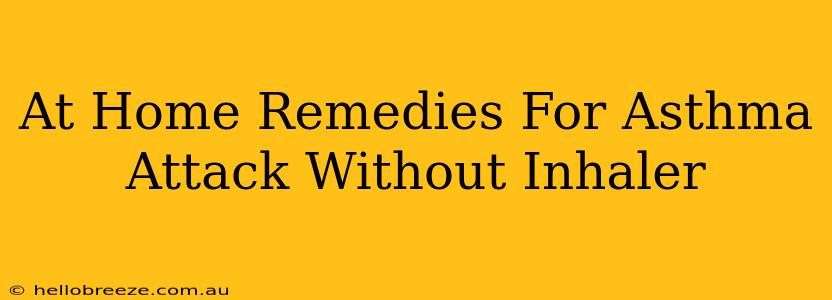Asthma can be a frightening experience, especially when an inhaler isn't readily available. While home remedies cannot replace prescribed medication, they can offer some relief during a mild attack or help manage symptoms between attacks. It's crucial to understand that these remedies are supportive measures and not a cure. Always consult your doctor for proper diagnosis and treatment of asthma. Ignoring medical advice and relying solely on home remedies can be dangerous.
Understanding Asthma Attacks
Before exploring home remedies, let's briefly understand what triggers asthma attacks. Common triggers include:
- Allergens: Dust mites, pollen, pet dander, mold
- Irritants: Smoke, air pollution, strong smells (perfumes, cleaning products)
- Respiratory infections: Cold, flu
- Exercise
- Stress
- Changes in weather
Knowing your personal triggers is crucial for effective asthma management. Keeping a journal of your attacks, noting the time, location, and potential triggers, can be incredibly helpful for you and your doctor.
Effective Home Remedies for Asthma Relief
These remedies might offer temporary relief from mild asthma symptoms. Remember, if symptoms worsen or don't improve, seek immediate medical attention.
1. Steam Inhalation:
Steam inhalation can help loosen mucus and open airways. Simply:
- Boil water in a pot.
- Carefully pour the hot water into a bowl.
- Drape a towel over your head and bowl.
- Inhale the steam for 10-15 minutes, ensuring not to burn yourself.
- You can add a few drops of eucalyptus oil for added relief (be cautious of allergies).
2. Warm Liquids:
Warm liquids, such as herbal tea (chamomile, ginger), warm broth, or even warm water with honey, can soothe irritated airways and help thin mucus. Avoid caffeinated beverages as they can exacerbate symptoms.
3. Guided Breathing Exercises:
Controlled breathing techniques can help regulate your breathing and reduce feelings of panic during an attack. Practicing deep, slow breaths can help calm your respiratory system. There are many guided breathing exercises available online and through apps.
4. Elevate Your Head:
Elevating your head with extra pillows can improve breathing by reducing pressure on your chest. This can provide a degree of comfort.
5. Identify and Avoid Triggers:
This is arguably the most important home remedy. Once you identify your personal triggers (dust mites, pollen, etc.), actively avoiding them is crucial in preventing future attacks.
6. Stay Hydrated:
Drinking plenty of water helps thin mucus, making it easier to cough up and clear your airways.
When to Seek Immediate Medical Attention
Never delay seeking medical attention if:
- You're experiencing difficulty breathing.
- Your chest feels tight.
- You're wheezing or coughing uncontrollably.
- Your lips or fingernails turn blue (cyanosis).
- Your symptoms worsen despite using home remedies.
These are signs of a severe asthma attack and require immediate medical help.
Asthma Management: A Holistic Approach
While home remedies can provide temporary relief, they are not a substitute for proper asthma management. Working closely with your doctor is essential. They can help you develop a personalized action plan, including prescribed medication, regular checkups, and guidance on managing triggers. Remember that proactive management is key to living a full and healthy life with asthma.

